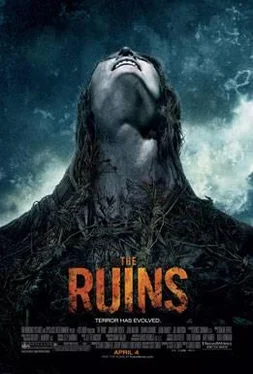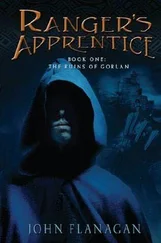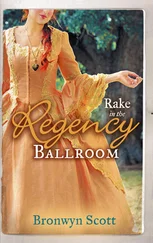Mathias gave him half a smile. "I don't want to die anywhere."
One of the Mayan men began to applaud by the campfire. The boy was juggling, the rocks arcing fluidly above his head, a look of amazement on his face, as if he weren't quite certain how he was accomplishing this feat. When he finally dropped one of the stones, the men cheered, slapping him on the back. The boy grinned, showing his teeth.
"But I guess I will, even so, won't I?" Mathias said.
There was a question in Jeff's head, a single word- Here? -but he didn't speak it. He was afraid of what Mathias might answer, he knew, frightened of the German's potential indifference to the possibility, his dismissive shrug. Pablo would go first, Jeff supposed. And then Eric. Stacy would likely be next, though maybe not; these things were probably hard to guess. But in the end, if Mathias was right, they'd all be reduced to vine-covered mounds. Jeff tried to imagine what would be left of himself-the zipper and rivets on his jeans, the rubber soles of his tennis shoes, his watch. And this shirt he'd pilfered from the backpacks, too, this fake khaki that he assumed must be some sort of polyester-it would be left draped across his empty rib cage. For some reason, this last image was the most unsettling detail of all, the idea of dying here in a stranger's clothes, so that when someone finally discovered them-and Mathias said it would have to happen, sooner or later-they'd assume the shirt had belonged to him.
"Are you a Christian?" he asked.
Mathias appeared amused by the question. He offered him that same half smile. "I was baptized one."
"But do you believe?"
The German shook his head, without hesitation.
"So what does dying mean to you?"
"Nothing. The end." Mathias cocked his head, looked at Jeff. "And you?"
"I don't know," Jeff said. "It sounds stupid, but I've never really thought about it. Not in a real way." It was true. Jeff had been raised an Episcopalian, yet in an absentminded manner; it had simply been one more duty of his childhood, no different than mowing the lawn, or taking piano lessons. Safely off at college, he'd stopped going to services. He was young, healthy, sheltered; death had held no sway over his thoughts.
Mathias gave a soft laugh, shook his head. "Poor Jeff."
"What?"
"Always so desperate to be prepared." He reached out, gave Jeff's knee a pat. "It will be whatever it is, no? Nothing, something-our believing one thing or another will matter not at all in the end."
Saying this, Mathias rose to his feet, stretching his arms over his head. He was getting ready to leave, Jeff could tell, and he felt a thrum of panic at the prospect. He couldn't have said why exactly, but he was afraid of being alone here. It was a premonition, of course, though Jeff never would've believed in the possibility. For some reason, what surfaced in his head was the memory of pulling the vine free from Amy's mouth, the slimy dampness of it, the smell of bile and tequila, the way the tendrils had clung to her face, resisting him, twisting and coiling as he tore them away. He shivered.
"What sort of place do you live in?" he asked.
Mathias stared down at him, not understanding.
"In Germany," Jeff said. "A house?
Mathias shook his head. "A flat."
"What's it like?"
"Nothing special. It's tiny. A bedroom, a sitting room, a kitchen-on the second floor, overlooking the street. There's a bakery downstairs. In the summer, the ovens make everything too hot."
"Can you smell the bread?"
"Of course. I wake to it every morning." It seemed like that might be all he was going to say, but then he continued. "I have a cat. His name is Katschen; it means kitten. The baker's daughter is watching him while I'm away. Feeding him, cleaning out his box. And watering my plants. I have a big window in my bedroom-how do you say it in English? A bay window?"
Jeff nodded.
"It's full of plants. Which is funny, I suppose. Every night, I went to sleep in a room full of plants. I found them calming." He laughed at this; so did Jeff. And then the clouds swept across the sun. Instantly, the light changed, became somber, autumnal. The wind gusted, and they both reached up, pressing their hats to their heads. When it passed, Mathias said, "I guess I'll go now."
Jeff nodded, and that was it; there was nothing more to say. He watched Mathias walk off up the trail.
There was the smell of cooking in the air. At first, Jeff thought it must be the vine again, fashioning some new torment for him. But when he turned back toward the clearing, he saw that the Mayan woman had set the big iron pot on its tripod over the fire; she was stirring something within it. Goat, Jeff thought, sniffing at the air. They were eating earlier than on the previous evenings, perhaps in the hope of finishing their meal before the storm's arrival.
Beneath the aroma of the food and campfire, Jeff could smell his own body. Stale sweat, with something worse lurking within it, some hint of Pablo's stench clinging to him, his urine and shit, his rotting flesh. Jeff thought about that bar of soap in the clearing outside the tent, readied for the rain's arrival. He tried to imagine what it would feel like to lather and scrub and rinse, but he couldn't bring himself to believe that it would have any impact, couldn't imagine that he would ever be cleansed of this foulness. Because it didn't feel merely like a physical sensation. No, the corruption seemed to run far deeper, as if what he reeked of was not simply sweat and urine and shit but also failure. He'd actually thought that he could keep them alive here; he'd believed that he was smarter and more disciplined than the others, and that these traits alone might save them. He was a fool, though; he could see that now. He'd been a fool to cut off Pablo's legs. All he'd managed to do was prolong the Greek's suffering. And he'd been a fool-worse than a fool, so much worse-to sit there pouting while, fifteen feet away from him, Amy had choked to death. Even if, through some miracle, he managed to leave this place alive, he couldn't see how he'd ever be able to survive that memory.
Time was passing. The Mayans finished their meal; the woman used a handful of leaves to wipe clean the pot. The men sat with their bows in their laps, watching Jeff. The boy had given up on his juggling; he'd retreated into the tree line, was lying down beneath the tarp. The crows continued to flap restlessly from branch to branch, cawing at one another. The sky grew darker and darker; the trees began to sway in the wind. Every time it gusted, the plastic tarp made a sharp snapping sound, like a rifle shot.
And then, finally, just as the day was edging its way into an early dusk, the rain arrived.
Stacy was in the tent with Eric.
She'd lost herself for a stretch, out there in the clearing, standing over that sleeping bag, while the vine writhed about at her feet, laughing. She'd started to cry, clutching Eric, and the tears had just kept coming. Long after Jeff had departed for the bottom of the hill, after the vine had fallen silent, even after Mathias had reappeared, she'd continued to sob. It had frightened her; she'd started to wonder if she'd ever be able to stop. But Eric kept hugging her, stroking her, saying, "Shh…shh," and eventually, through fatigue, if nothing else, she'd felt herself begin to quiet.
"I have to lie down," she'd whispered.
That was how they'd ended up inside the tent again. Eric had unzipped the flap for her, followed her through it. When she'd collapsed onto the remaining sleeping bag, he had, too, snuggling up behind her. After the tears, there came a heaviness, a sense of not being able to go on. This , too, will pass, Stacy told herself, and tried to believe it. She remembered sitting at the bottom of the hill that morning, all alone, how interminable those three hours had felt, how impossible to survive. And yet she'd managed: She'd sat there in the sun, struggling not to think of Amy-struggling and failing-and one moment had led to the next, until suddenly she'd turned and found Mathias standing behind her, telling her it was time, that she was done, that she could hike back up the hill.
Читать дальше












